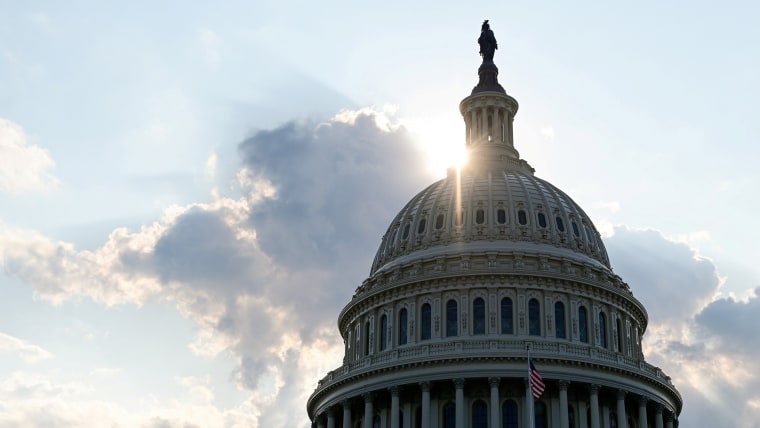
IRS workers describe shortages of staff and printer paper. Critics see a powerful agency hostile to taxpayers.
The Internal Revenue Service is on the brink of a major funding infusion from Congress that Democrats and agency workers say is badly needed to boost efficiency and revenues, but the plan has inflamed critics on the right who see the IRS as a tool of government overreach, as disinformation around the proposal swirls on social media and cable news.
At the IRS office in Cincinnati, where Will Kohler works as a tax examiner, supply shortages mean he sometimes has to use his own pens and paper clips. He has even brought in paper for the copy machine over his 10 years there, which he says is just part of the job at the chronically paperbound and technologically outdated agency.
Kohler and other IRS employees said the $80 billion spread out over a decade contained in the Inflation Reduction Act — the Democrats' climate and spending bill expected to pass the House on Friday — would help address bottlenecks partly due to staffing issues, which can add delays and complications for taxpayers and employees alike.
In interviews, staffers described challenges familiar to workers across the economy, who in recent years have been asked to do more with less by employers plagued by labor shortfalls and tight resources.
“I mean, it’s a factory,” said Kohler. “And when there’s been no money and they’ve not been able to hire good people, it’s been bad.”
The IRS, which is overseen by the Treasury Department, has shed about 13% of its staff since 2012. With about 79,000 current employees, its headcount has receded to near-1974 levels, the agency’s director told Congress earlier this year, despite growing revenue and some 14% more taxpayers filing returns in the last 10 years. Over the same period, the IRS’s budget has dropped from $14.3 billion to $13.7 billion in the 2021 fiscal year, or around 15% when adjusted for inflation, according to the agency.
House debates Inflation Reduction Act ahead of significant vote for Biden presidency
Aug. 12, 202208:18Staffing in enforcement has fallen even more sharply, by 30% since 2010, even while the tax code — and businesses’ and individuals’ maneuvers to circumvent it — have become more complex.
Natasha Sarin, a counselor for tax policy in the Treasury Department, acknowledged that the IRS has been “a hard place to work over the last decade because of budget cuts and lack of funding,” which she said has dragged down workers’ efficiency.
Echoing Kohler’s experience, she said “people have had to buy staplers, buy red pens, buy Band-Aids that come from having to deal with so much paper-processing.”
The proposed funding, which would let IRS hire some 87,000 people over the next decade, should help, employees said. That number includes replacing some 52,000 employees who are expected to leave or retire in coming years, as the workforce has aged amid budget declines. That could bring overall staffing up to more than 110,000, a level not seen since the mid-1990s. Returns, meanwhile, have been growing, from 118 million individuals in 1995 to 168 million last year.
The IRS says it will use the resources to put more focus on high net-worth individuals and businesses, with Director Charles P. Rettig, a Trump-appointee, telling Congress recently that enforcement would heed a Treasury directive not to raise audit rates for households making less than $400,000 a year.
Still, the proposal has drawn blowback among some skeptics who argue it will cause more headaches for everyday taxpayers.
Joe Bishop-Henchman, a policy analyst at the National Taxpayers Union Foundation, said the group, which advocates for lower taxes, was concerned that the enforcement resources would be trained on middle-class households and small businesses because of the steep costs and legal challenges of regulating wealthy households and corporations.
“We’ve seen this cycle of the IRS pleading poverty and how they just don’t have enough staff and just don’t have enough resources,” he said. “The rich have lawyers. The rich fight back, so they go after the people that don’t fight back.” He added that the middle class and small businesses “have a lot of the money” the IRS aims to collect, so the agency “just goes wild.”
Some conservative officials and commentators have sought to raise fears about the funding in more extreme terms, particularly in the days following the FBI search of former President Trump’s Mar-a-Lago residence this week, with some falsely claiming it could lead to widespread state violence.
Fox News personality Brian Kilmeade described a bolstered IRS as “Joe Biden’s new army” and told viewers that armed agents could “hunt down and kill middle-class taxpayers that don’t pay enough.” Speaking against the bill in Congress Friday, Rep. Lauren Boebert, a Republican from Colorado, said firearm-carrying IRS officials would be “committing armed robbery on Americans.”
In recent days, far-right figures and militia groups on social media platforms like TikTok cited the planned IRS funding in apocalyptic warnings about civil war and federal plans to seize citizens’ guns. Some of the outcry has focused on job postings for the IRS’s criminal division, which conducts investigative work that isn’t part of routine tax processing or auditing.
Individual audit rates fell steadily between 2010 and 2019 across all income brackets, with the average rate at the end of that period — 0.25% of all filers — less than a third the level at the start of it, according to a recent report from the U.S. Government Accountability Office. But audit rates have fallen more steeply for people who make more than $200,000 a year, a change the IRS attributes to a lack of resources.
Audits of wealthy filers and large corporations are extremely labor-intensive but can pay for themselves many times over. One staffer in the division focused on large and international businesses said he opened eight audits in the last two years, closing three of them. Two of those had no change in tax, while the third recouped about $1 million for the government. On average, every $1 spent on IRS enforcement has brought back between $5 and $9 in revenue in recent years, according to the nonpartisan Congressional Budget Office.
Amy Hanauer, the executive director for the Institute on Taxation and Economic Policy, which supports efforts to recoup more tax revenue from big companies and high earners, voiced optimism about the planned funding. “My hope is that this will begin to restore trust from Americans that our tax system is fairer than it was — that corporations aren’t being allowed to pay no taxes,” she said.
In the meantime, IRS staffing shortages can make it hard for existing employees to get their jobs done. Lorie Y. McCann, a senior program analyst in Chicago and the president of the local National Treasury Employees Union chapter, said more than 90% of the complaints she hears from colleagues are related to understaffing.
“There’s not one division in the agency that doesn’t have issues with understaffing at this point,” said McCann, who has been at the IRS for 31 years. “When your co-workers have retired or resigned, the work doesn’t go away.”
Steven Eldridge, 30, a technician in Austin who has worked at the IRS for two years, said his supervisors have been offering workers as many as 76 hours of overtime every two weeks to help with backlogs.
He effectively works two jobs: His main responsibility is helping resolve errors on tax returns, an often cumbersome process of reconciling paper forms with the agency’s outdated computing system. But he also works as an “OJI” — an on-the-job instructor, training and helping new hires get up to speed with the agency’s programs.
The instructing needs now take up the bulk of his time, as the agency works to plug gaps from attrition with new hires. So Eldridge has been working long weeks — 65 hours last week, 70 hours this week — to keep up.
Like many employers grappling with a tight labor market, the IRS has been struggling to bring in and hold on to new staffers. The average agent makes about $62,000 a year, according to jobs site ZipRecruiter, but the most popular role — phone reps the IRS says it’s hungry to hire as call service has suffered — makes less than that on average.
The pay range for phone reps is about $40,000 to $55,000 a year, with some variation, in expensive cities like New York, Oakland, Washington and Denver, according to federal data.
An human resources specialist in Kansas City whose focus has been hiring for the phone lines, said that turnover remains a major problem, largely because the pay has fallen behind rising wages in the private sector.
Source: https://www.nbcnews.com/business/irs-agents-tax-audits-inflation-reduction-act-rcna42554







